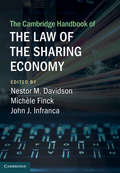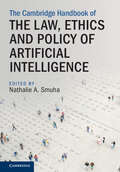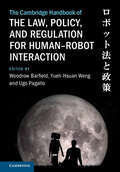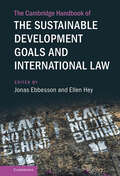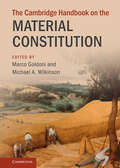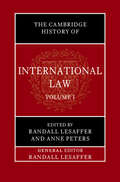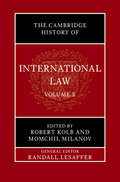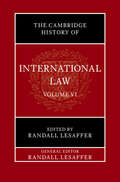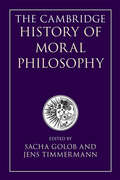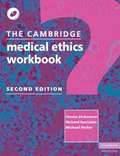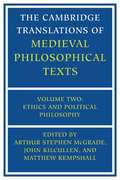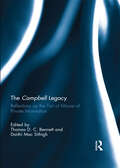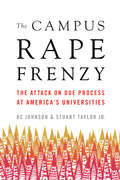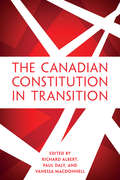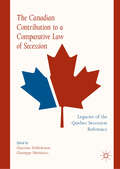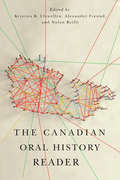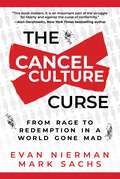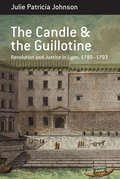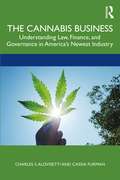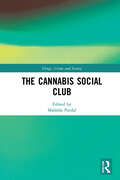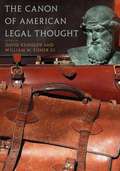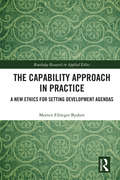- Table View
- List View
The Cambridge Handbook of the Law of the Sharing Economy
by Nestor M. Davidson Michèle Finck John J. InfrancaThis Handbook grapples conceptually and practically with what the sharing economy - which includes entities ranging from large for-profit firms like Airbnb, Uber, Lyft, Taskrabbit, and Upwork to smaller, non-profit collaborative initiatives - means for law, and how law, in turn, is shaping critical aspects of the sharing economy. Featuring a diverse set of contributors from many academic disciplines and countries, the book compiles the most important, up-to-date research on the regulation of the sharing economy. The first part surveys the nature of the sharing economy, explores the central challenge of balancing innovation and regulatory concerns, and examines the institutions confronting these regulatory challenges, and the second part turns to a series of specific regulatory domains, including labor and employment law, consumer protection, tax, and civil rights. This groundbreaking work should be read by anyone interested in the dynamic relationship between law and the sharing economy.
The Cambridge Handbook of the Law, Ethics and Policy of Artificial Intelligence (Cambridge Law Handbooks)
by Nathalie A. SmuhaThis informative Handbook provides a comprehensive overview of the legal, ethical, and policy implications of AI and algorithmic systems. As these technologies continue to impact various aspects of our lives, it is crucial to understand and assess the challenges and opportunities they present. Drawing on contributions from experts in various disciplines, the book covers theoretical insights and practical examples of how AI systems are used in society today. It also explores the legal and policy instruments governing AI, with a focus on Europe. The interdisciplinary approach of this book makes it an invaluable resource for anyone seeking to gain a deeper understanding of AI's impact on society and how it should be regulated. This title is also available as Open Access on Cambridge Core.
The Cambridge Handbook of the Law, Policy, and Regulation for Human–Robot Interaction (Cambridge Law Handbooks)
by Ugo Pagallo Woodrow Barfield Yueh-Hsuan WengThis volume provides a unique perspective on an emerging area of scholarship and legislative concern: the law, policy, and regulation of human-robot interaction (HRI). The increasing intelligence and human-likeness of social robots points to a challenging future for determining appropriate laws, policies, and regulations related to the design and use of AI robots. Japan, China, South Korea, and the US, along with the European Union, Australia and other countries are beginning to determine how to regulate AI-enabled robots, which concerns not only the law, but also issues of public policy and dilemmas of applied ethics affected by our personal interactions with social robots. The volume's interdisciplinary approach dissects both the specificities of multiple jurisdictions and the moral and legal challenges posed by human-like robots. As robots become more like us, so too will HRI raise issues triggered by human interactions with other people.
The Cambridge Handbook of the Sustainable Development Goals and International Law: Volume 1 (Cambridge Law Handbooks)
by Ellen Hey Jonas EbbessonIn 2015, the United Nations established seventeen Sustainable Development Goals (SDG) that aimed 'to achieve a better and more sustainable future for all' by 2030. The chapters within this collection address each of these SDGs, considering how they relate to one another and international law, and what institutions could aid their implementation. Development has been a contentious topic since the decolonization period after World War II, and issues surrounding sustainable development are necessarily impacted by the multifaceted relationship between the Global South and Global North. Confronting the context and challenge of sustainable development, this collection outlines how the international economic system problematizes the attainment of the SDGs. Introducing a novel, cosmopolitan approach, this book offers new ways of understanding sustainable development and suggests potential solutions so that we might finally achieve it.
The Cambridge Handbook on the Material Constitution (Cambridge Law Handbooks)
by Marco Goldoni Michael A. WilkinsonDespite a long and venerable tradition, the material constitution almost disappeared from constitutional scholarship after the Second World War. Its marginalisation saw the rise of a normative and legalistic style in constitutional law that neglected the role of social reality and political economy. This collection not only retrieves the history and development of the concept of the material constitution, but it tests its theoretical and practical relevance in the contemporary world. With essays from a diverse range of contributors, the collection demonstrates that the material constitution speaks to several pressing issues, from the significance of economic development in constitutional orders to questions of constitutional identity. Offering original analyses supported by international case studies, this book develops a new model of constitutional reality, one that informs our understanding of the world in profound ways.
The Cambridge History of International Law: Volume 1, The Historiography of International Law (The Cambridge History of International Law)
by Anne Peters Randall LesafferVolume I of The Cambridge History of International Law introduces the historiography of international law as a field of scholarship. After a general introduction to the purposes and design of the series, Part 1 of this volume highlights the diversity of the field in terms of methodologies, disciplinary approaches, and perspectives that have informed both older and newer historiographies in the recent three decades of its rapid expansion. Part 2 surveys the history of international legal history writing from different regions of the world, spanning roughly the past two centuries. The book therefore offers the most complete treatment of the historical development and current state of international law history writing, using both a global and an interdisciplinary perspective.
The Cambridge History of International Law: Volume 10, International Law at the Time of the League of Nations (The Cambridge History of International Law)
by Randall Lesaffer Robert Kolb Pavle Kilibarda Momchil MilanovVolume X of The Cambridge History of International Law offers the most comprehensive and critical discussion of the history of international law in the interwar period to date. Bringing together scholars across various disciplines, the volume aims to go beyond the well-established cliché of the failure of the League of Nations and discusses the huge impact this period had on the post-WWII international legal order. It focuses on the League of Nations as an important milestone to be studied, analysed, and understood in its own right. Using a global perspective, the volume sheds light on the different branches of international law in this dynamic period, during which the discipline underwent a qualitative leap.
The Cambridge History of International Law: Volume 6, International Law in Early Modern Europe (The Cambridge History of International Law)
by Randall LesafferVolume VI of The Cambridge History of International Law offers a survey of the law of nations in early modern Europe through a balanced treatment of legal theory and diplomatic practice. Bringing together a wide range of scholars, this volume builds on recent historiographical insights from different disciplines, including legal history, diplomatic history, and the history of political thought. It considers all major themes ranging from the allocation of jurisdiction over land and sea, war- and peace- making, trade and navigation to diplomacy and dispute settlement. A unique overall synthesis of early modern law across nations in Europe.
The Cambridge History of Moral Philosophy: Groundwork Of The Metaphysics Of Morals (Cambridge Texts In The History Of Philosophy Ser.)
by Jens Timmermann Sacha GolobWith fifty-four chapters charting the development of moral philosophy in the Western world, this volume examines the key thinkers and texts and their influence on the history of moral thought from the pre-Socratics to the present day. Topics including Epicureanism, humanism, Jewish and Arabic thought, perfectionism, pragmatism, idealism and intuitionism are all explored, as are figures including Aristotle, Boethius, Spinoza, Hobbes, Hume, Kant, Hegel, Mill, Nietzsche, Heidegger, Sartre and Rawls, as well as numerous key ideas and schools of thought. Chapters are written by leading experts in the field, drawing on the latest research to offer rigorous analysis of the canonical figures and movements of this branch of philosophy. The volume provides a comprehensive yet philosophically advanced resource for students and teachers alike as they approach, and refine their understanding of, the central issues in moral thought.
The Cambridge Medical Ethics Workbook
by Donna Dickenson Richard Huxtable Michael ParkerThis new edition of The Cambridge Medical Ethics Workbook builds on the success of the first edition by working from the 'bottom up', with a widely praised case-based approach. A variety of guided exercises are supplemented by short papers and commentaries on legal and ethical issues, challenging readers to develop their own analyses and recommendations. Chapters cover death, genetics, new reproductive technologies, research, long-term care, mental health, children and young people, allocation of scarce resources, and general issues about autonomy and patient choice. An appendix discusses the use of this book in teaching, along with a full bibliography, list of Kennedy Institute keywords, and suggestions for further reading. An interactive CD-ROM packaged with the book provides extra cases, a glossary, legal references and the chance to record a personal learning diary. Its simple, clear style makes this book ideal for individual reference and as a set text for group teaching.
The Cambridge Textbook of Bioethics
by Peter A. Singer A. M. ViensMedicine and health care generate many bioethical problems and dilemmas that are of great academic, professional and public interest. This comprehensive resource is designed as a succinct yet authoritative text and reference for clinicians, bioethicists, and advanced students seeking a better understanding of ethics problems in the clinical setting. Each chapter illustrates an ethical problem that might be encountered in everyday practice; defines the concepts at issue; examines their implications from the perspectives of ethics, law and policy; and then provides a practical resolution. There are 10 key sections presenting the most vital topics and clinically relevant areas of modern bioethics. International, interdisciplinary authorship and cross-cultural orientation ensure suitability for a worldwide audience. This book will assist all clinicians in making well-reasoned and defensible decisions by developing their awareness of ethical considerations and teaching the analytical skills to deal with them effectively.
The Cambridge Translations of Medieval Philosophical Texts: Volume II Ethics and Political Philosophy
by Arthur Stephen Mcgrade John Kilcullen Matthew KempshallThe eagerly-awaited second volume of The Cambridge Translations of Medieval Philosophical Texts will allow scholars and students access for the first time in English to major texts in ethics and political thought from one of the most fruitful periods of speculation and analysis in the history of western thought. Beginning with Albert the Great, who introduced the Latin west to the challenging moral philosophy and natural science of Aristotle, and concluding with the first substantial presentation in English of the revolutionary ideas on property and political power of John Wyclif, the seventeen texts in this anthology offer late medieval treatments of fundamental issues in human conduct that are both conceptually subtle and of direct practical import. Special features of this volume include copious editorial introductions, an analytical index, and suggestions for further reading. This is an important resource for scholars and students of medieval philosophy, history, political science, theology and literature.
The Campbell Legacy: Reflections on the Tort of Misuse of Private Information
by Thomas D. C. Bennett and Daithí Mac SíthighIn 2004, a judgment from the highest court in the UK gave birth to a new era of privacy law. That case, brought by the supermodel Naomi Campbell against Mirror Group Newspapers, is today rightly regarded as a turning point for the protection of individuals’ privacy. The case is seen as the turning point in the development of English privacy law, and has also had major implications for the law elsewhere, including in Australia, New Zealand, Ireland, and Canada. The manner in which the common law’s privacy protections have developed since, and the direction in which they might develop still further, are the subject of this book. This collection, written by leading scholars in the privacy field from the UK and beyond, considers the legacy of Campbell’s case. The contributors address the Campbell legacy from a range of legal perspectives and discuss broader themes of power, metaphor, consistency, and technological change. This book was originally published as a special issue of the Journal of Media Law.
The Campus Rape Frenzy: The Attack on Due Process at America's Universities
by Stuart Taylor Jr. Kc JohnsonIn recent years, politicians led by President Obama and prominent senators and governors have teamed with extremists on campus to portray our nation’s campuses as awash in a violent crime wave-and to suggest (preposterously) that university leaders, professors, and students are indifferent to female sexual assault victims in their midst. Neither of these claims has any bearing in reality. But they have achieved widespread acceptance, thanks in part to misleading alarums from the Obama administration and biased media coverage led by the New York Times.The frenzy about campus rape has helped stimulate-and has been fanned by-ideologically skewed campus sexual assault policies and lawless commands issued by federal bureaucrats to force the nation’s all-too-compliant colleges and universities essentially to presume the guilt of accused students. The result has been a widespread disregard of such bedrock American principles as the presumption of innocence and the need for fair play.This book uses hard facts to set the record straight. It explores, among other things, about two dozen of the many cases since 2010 in which innocent or probably innocent students have been branded as sex criminals and expelled or otherwise punished by their colleges. And it shows why all students-and, eventually, society as a whole-are harmed when our nation’s universities abandon pursuit of truth and seek instead to accommodate the passions of the mob.
The Canadian Constitution in Transition
by Paul Daly Richard Albert Vanessa MacDonnellThe year 2017 marked the 150th anniversary of Confederation and the 1867 Constitution Act. Anniversaries like these are often seized upon as opportunities for retrospection. This volume, by contrast, takes a distinctively forward-looking approach. Featuring essays from both emerging and established scholars, The Canadian Constitution in Transition reflects on the ideas that will shape the development of Canadian constitutional law in the decades to come. Moving beyond the frameworks that previous generations used to organize constitutional thinking, the scholars in this volume highlight new and innovative approaches to perennial problems, and seek new insights on where constitutional law is heading. Featuring fresh scholarship from contributors who will lead the constitutional conversation in the years ahead - and who represent the gender, ethnic, linguistic, and demographic make-up of contemporary Canada - The Canadian Constitution in Transition enriches our understanding of the Constitution of Canada, and uses various methodological approaches to chart the course toward the bicentennial.
The Canadian Contribution to a Comparative Law of Secession: Legacies Of The Quebec Secession Reference
by Giacomo Delledonne Giuseppe MartinicoThis edited collection gathers together Canadian and non-Canadian scholars to reflect on and celebrate the 20thanniversary of the Quebec Secession Reference, delivered by the Canadian Supreme Court in 1998. It opens withtwo Canadian scholars exchanging thoughts on the legacy of the reference from a domestic perspective as one ofthe most questioned decisions of the Canadian Supreme Court. To follow, non-Canadian scholars discuss theimpact of this reference abroad, reflecting upon its influence in European and non-European contexts (Spain,Scotland, the EU after Brexit, Eastern European Countries, Ethiopia, and Asia). Two final chapters, one by a lawyerand one by a political scientist, explore the democratic theory behind that reference.
The Canadian Oral History Reader
by Alexander Freund Nolan Reilly Kristina R. LlewellynDespite a long and rich tradition of oral history research, few are aware of the innovative and groundbreaking work of oral historians in Canada. For this first primer on the practices within the discipline, the editors of The Canadian Oral History Reader have gathered some of the best contributions from a diverse field. Essays survey and explore fundamental and often thorny aspects in oral history methodology, interpretation, preservation and presentation, and advocacy. In plain language, they explain how to conduct research with indigenous communities, navigate difficult relationships with informants, and negotiate issues of copyright, slander, and libel. The authors ask how people's memories and stories can be used as historical evidence - and whether it is ethical to use them at all. Their detailed and compelling case studies draw readers into the thrills and predicaments of recording people's most intimate experiences, and refashioning them in transcripts and academic analyses. They also consider how to best present and preserve this invaluable archive of Canadian memories. The Canadian Oral History Reader provides a rich resource for community and university researchers, undergraduate and graduate students, and independent scholars and documentarians, and serves as a springboard and reference point for global discussions about Canadian contributions to the international practice of oral history. Contributors include Brian Calliou (independent scholar), Elise Chenier (Simon Fraser University), Julie Cruikshank (University of British Columbia), Alexander Freund (University of Winnipeg), Steven High (Concordia University), Nancy Janovicek (University of Calgary), Jill Jarvis-Tonus (independent scholar), Kristina R. Llewellyn (Renison University College, University of Waterloo), Bronwen Low (McGill University), Claudia Malacrida (University of Lethbridge), Joy Parr (Western University), Joan Sangster (Trent University), Emmanuelle Sonntag (Université du Québec à Montréal), Pamela Sugiman (Ryerson University), Winona Wheeler (University of Saskatchewan), and Stacey Zembrzycki (Concordia University).
The Canadian Oral History Reader (Carleton Library Series #231)
by Alexander Freund Nolan Reilly Kristina R. LlewellynDespite a long and rich tradition of oral history research, few are aware of the innovative and groundbreaking work of oral historians in Canada. For this first primer on the practices within the discipline, the editors of The Canadian Oral History Reader have gathered some of the best contributions from a diverse field. Essays survey and explore fundamental and often thorny aspects in oral history methodology, interpretation, preservation and presentation, and advocacy. In plain language, they explain how to conduct research with indigenous communities, navigate difficult relationships with informants, and negotiate issues of copyright, slander, and libel. The authors ask how people’s memories and stories can be used as historical evidence – and whether it is ethical to use them at all. Their detailed and compelling case studies draw readers into the thrills and predicaments of recording people’s most intimate experiences, and refashioning them in transcripts and academic analyses. They also consider how to best present and preserve this invaluable archive of Canadian memories. The Canadian Oral History Reader provides a rich resource for community and university researchers, undergraduate and graduate students, and independent scholars and documentarians, and serves as a springboard and reference point for global discussions about Canadian contributions to the international practice of oral history. Contributors include Brian Calliou (independent scholar), Elise Chenier (Simon Fraser University), Julie Cruikshank (University of British Columbia), Alexander Freund (University of Winnipeg), Steven High (Concordia University), Nancy Janovicek (University of Calgary), Jill Jarvis-Tonus (independent scholar), Kristina R. Llewellyn (Renison University College, University of Waterloo), Bronwen Low (McGill University), Claudia Malacrida (University of Lethbridge), Joy Parr (Western University), Joan Sangster (Trent University), Emmanuelle Sonntag (Université du Québec à Montréal), Pamela Sugiman (Ryerson University), Winona Wheeler (University of Saskatchewan), and Stacey Zembrzycki (Concordia University).
The Cancel Culture Curse: From Rage to Redemption in a World Gone Mad
by Evan Nierman Mark SachsIn a groundbreaking first, cancel culture and its core elements are clearly defined, and a convincing case is made against this fundamentally un-American practice. Cancel culture is an insidious force in society today. In the seconds it takes to make one regrettable social media post—or wind up on the wrong side of a false accusation or misunderstanding—reputations, relationships, and careers are destroyed. Have we entered an era when people cannot make mistakes; where no apology or change of heart can ever deliver forgiveness? Making a comeback used to be a celebrated American ideal. But have the roads to redemption been permanently blocked by internet mobs seeking vengeance? In The Cancel Culture Curse, global crisis manager Evan Nierman and his colleague Mark Sachs examine the impact of cancel culture in today&’s media-driven world. The authors also explore the history of cancel culture and the trends that have fostered it, defining the telltale elements that are hallmarks of such campaigns. Nierman and Sachs provide fascinating case studies and interviews with well-known victims of cancel culture, including philosopher Peter Boghossian, Mumford & Sons cofounder Winston Marshall, and &“San Francisco Karen,&” among others. Also featured, is a playbook for rebounding from public shame, helping readers avoid becoming the latest targets of &“cancel vultures&” who enjoy picking apart the remains of those left to die on the side of the Internet highway.
The Candle and the Guillotine: Revolution and Justice in Lyon, 1789–93 (Berghahn Monographs in French Studies #17)
by Julie Patricia JohnsonAs in a number of France’s major cities, civil war erupted in Lyon in the summer of 1793, ultimately leading to a siege of the city and a wave of mass executions. Using Lyon as a lens for understanding the politics of revolutionary France, this book reveals the widespread enthusiasm for judicial change in Lyon at the time of the Revolution, as well as the conflicts that ensued between elected magistrates in the face of radical democratization. Julie Patricia Johnson’s investigation of these developments during the bloodiest years of the Revolution offers powerful insights into the passions and the struggles of ordinary people during an extraordinary time.
The Cannabis Business: Understanding Law, Finance, and Governance in America’s Newest Industry
by Charles S. Alovisetti Cassia FurmanAs the largely illicit cannabis market transitions to a legal, regulated industry, the "canna-curious" and experienced industry participants alike are experiencing the harsh truth: Making a fortune in the legal cannabis industry is a challenge made even more difficult by a complex patchwork of state and federal laws. The Cannabis Business clears the confusion around topics such as the distinction between hemp and cannabis and why it matters for consumers and regulators, why CBD isn’t completely legal in the U.S., why and how states differ in their licensing processes, and how deal structuring is impacted by state regulations. Written by attorneys from the nation’s leading cannabis law and policy firm, this comprehensive primer on all things cannabis law is a must-have for anyone seeking to understand the major practical legal issues facing the cannabis industry in the U.S.
The Cannabis Social Club (Drugs, Crime and Society)
by Mafalda PardalAs cannabis legalization reforms are underway, there is some concern that non-profit, ‘middle ground’ options may remain under-researched and thus less visible. This book offers an in-depth account of one of the possible ‘middle ground’ models for the supply of cannabis: the Cannabis Social Club. Cannabis Social Clubs (CSCs) are typically formal, non-profit associations of adult cannabis users who produce and distribute that substance close to or at cost price among themselves. They constitute an user-driven model for the supply of cannabis. In most jurisdictions, CSCs remain a grass roots, unregulated initiative of groups of users, but the model has been legalized in Uruguay and Malta, and it has featured recent debates and legislative proposals in other countries. This book brings together contributions from internationally respected scholars, drawing on case studies, empirical findings and policy reflections, from a range of countries (such as Belgium, Canada, New Zealand, Spain, Uruguay, USA), and a consideration of the CSC model from different disciplinary backgrounds. Part one provides detailed analysis of where and how CSCs have been operating, and a critical analysis of their key features and relationship with institutional actors. Part two discusses several policy outcomes and proposes a design of a regulatory market, as well as considering whether the CSC model might be suited for adaptation to the supply of other substances. The Cannabis Social Club is important reading for academics in the fields of drug policy analysis, criminology, economics, policy studies and anthropology. It will also be of interest to policy makers, journalists, law-enforcement personnel.
The Canon Of American Legal Thought
by David Kennedy William W. FisherThis anthology presents, for the first time, full texts of the twenty most important works of American legal thought since 1890. Drawing on a course the editors teach at Harvard Law School, the book traces the rise and evolution of a distinctly American form of legal reasoning. These are the articles that have made these authors--from Oliver Wendell Holmes, Jr., to Ronald Coase, from Ronald Dworkin to Catherine MacKinnon--among the most recognized names in American legal history. <P><P> These authors proposed answers to the classic question: "What does it mean to think like a lawyer--an American lawyer?" Their answers differed, but taken together they form a powerful brief for the existence of a distinct and powerful style of reasoning--and of rulership. The legal mind is as often critical as constructive, however, and these texts form a canon of critical thinking, a toolbox for resisting and unravelling the arguments of the best legal minds. Each article is preceded by a short introduction highlighting the article's main ideas and situating it in the context of its author's broader intellectual projects, the scholarly debates of his or her time, and the reception the article received. <P><P> Law students and their teachers will benefit from seeing these classic writings, in full, in the context of their original development. For lawyers, the collection will take them back to their best days in law school. All readers will be struck by the richness, the subtlety, and the sophistication with which so many of what have become the clichés of everyday legal argument were originally formulated.
The Canonization of Islamic Law
by Ahmed El ShamsyThe Canonization of Islamic Law tells the story of the birth of classical Islamic law in the eighth and ninth centuries CE. It shows how an oral normative tradition embedded in communal practice was transformed into a systematic legal science defined by hermeneutic analysis of a clearly demarcated scriptural canon. This transformation was inaugurated by the innovative legal theory of Muḥammad b. Idrīs al-Shāfiʿī (d. 820 CE), and it took place against the background of a crisis of identity and religious authority in ninth-century Egypt. By tracing the formulation, reception, interpretation, and spread of al-Shāfiʿī's ideas, the author demonstrates how the canonization of scripture that lay at the heart of al-Shāfiʿī's theory formed the basis for the emergence of legal hermeneutics, the formation of the Sunni schools of law, and the creation of a shared methodological basis in Muslim thought.
The Capability Approach in Practice: A New Ethics in Setting Development Agendas (Routledge Research in Applied Ethics)
by Morten Fibieger ByskovThis book develops a philosophical framework for selecting goals for development purposes. This inclusive and democratic framework integrates a variety of resources including philosophical theory, empirical analysis, stakeholder deliberations, local knowledge, and advice from development experts. The author contends that we must provide good reasons and arguments in order to justify a particular development agenda. That is, we need to ask why we choose certain kinds of development goals over others, why we include certain agents in the selection process and not others, and why we select goals through one method rather than another. In response to these questions, the author argues that development should aim at expanding people’s capabilities and functionings. Capabilities and functionings—capabilities that have been realized—tell us what people are actually able to do and be with their resources, goods, and formal freedoms. He advances the view that local stakeholders should have more authority in deciding what a development agenda looks like. This claim to local authority in development can be interpreted both as a claim to political authority and expert authority. Finally, the author argues that ad hoc, foundational, procedural, and mixed (multi-stage) methods need to be synthesized in order to select the best capabilities and functionings for development. The Capability Approach in Practice provides a philosophical and systematic approach to setting development agendas. It is an important contribution to the literature on the capability approach and development ethics, which will appeal to a broad range of scholars within philosophy and development studies.
